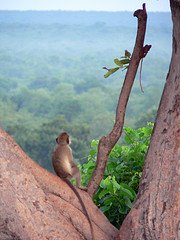American Scientist Online - Mirror, Mirror:
"In another, less theoretical, case, the paradox of using animal models for research—that they are both categorically different from us and alike enough to study—begs resolution. The same similarities that justify the use of animals in biomedical research (an implicit anthropomorphism) clash with the dissimilarities that justify the ethics of vivisection (an implicit anthropodenial).
Trouble in Mind
Such conceptual turbulence might have remained hidden as part of the usual back-and-forth of science if the topic did not evoke such visceral responses. Old prejudices are hard to relinquish, and humans have held themselves apart from other species for centuries, if not millennia. Oxford evolutionary biologist Richard Dawkins refers to this posture as 'the tyranny of the discontinuous mind.' The same impetus gave rise to the medieval concept of the 'great chain of being,' in which humans sat above the animals but below the angels. Parasitologist Sean Nee at the University of Edinburgh attributes this self-segregation to a deep-seated fear of sameness. Regardless of its origin, bidirectional inference threatens the belief in human superiority and the self-image of those who adhere to it.
Thirty years ago, Goodall's chimpanzees reflected back something that induced powerful theoretical shifts; they may even be credited with introducing disruptive cultural change. The rapidity with which theory and data have moved since then to create a new, radically different framework portends equally significant change to come. Readjusting to a convention of bidirectional inference helps restore a sense of epistemic coherency in scientific theory and practice. And, as Kuhn reminds us, no matter what turmoil such change may engender and how daunting it may appear, the ability to embrace"
Oct 13, 2006
American Scientist Online - Mirror, Mirror
posted at 3:14 PM
Labels: Great Apes, primate evolution Hotlinks: DiggIt! Del.icio.us
Subscribe to:
Post Comments (Atom)


0 Comments:
Post a Comment